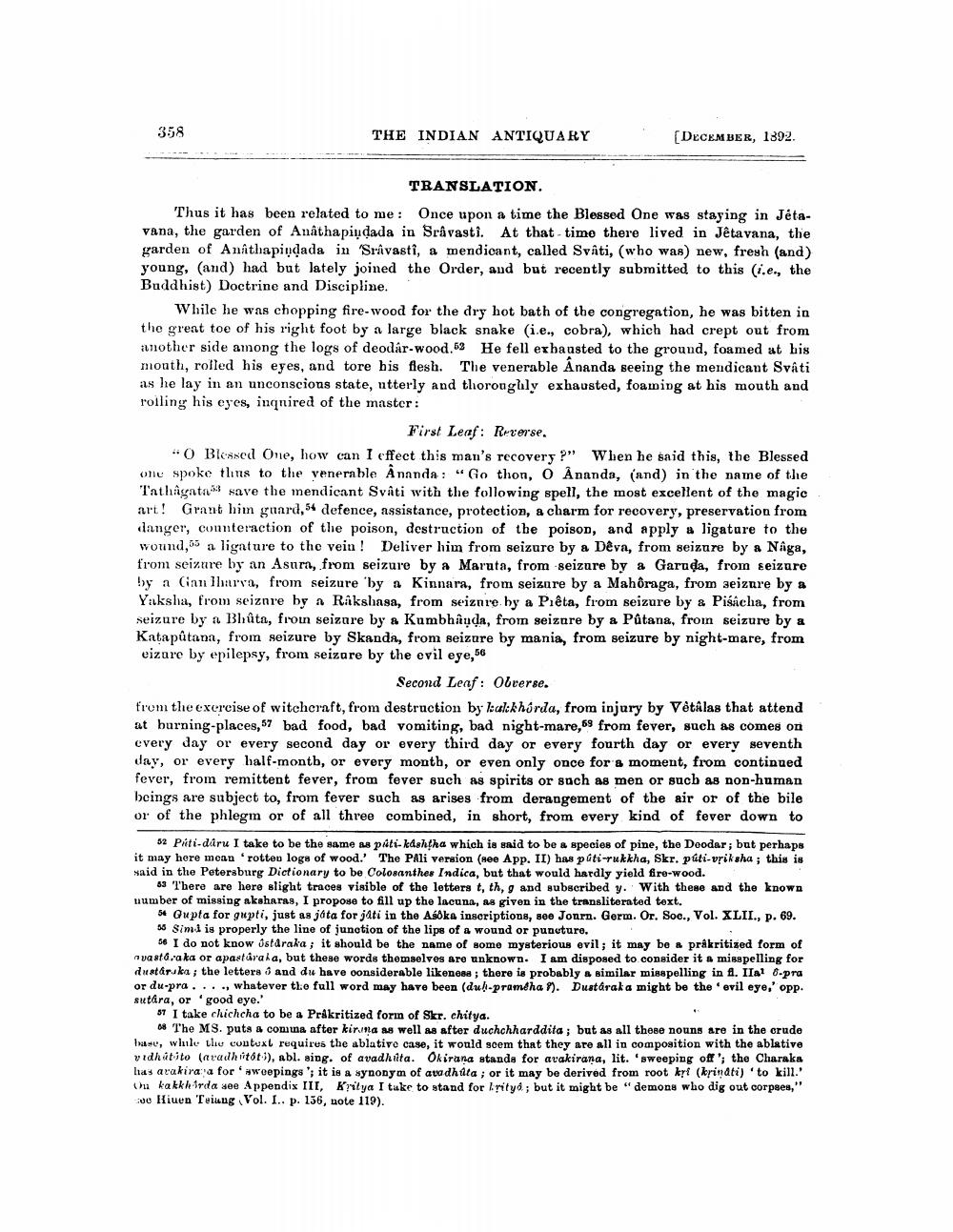________________
358
THE INDIAN ANTIQUARY
[DECEMBER, 1892.
TRANSLATION.
Thus it has been related to me: Once upon a time the Blessed One was staying in Jétavana, the garden of Anathapindada in Srâvasti. At that time there lived in Jêtavana, the garden of Anathapindada in 'Srâvastî, a mendicant, called Svâti, (who was) new, fresh (and) young, (and) had but lately joined the Order, and but recently submitted to this (ie., the Buddhist) Doctrine and Discipline.
While he was chopping fire-wood for the dry hot bath of the congregation, he was bitten in the great toe of his right foot by a large black snake (ie., cobra), which had crept out from another side among the logs of deodár-wood. He fell exhausted to the ground, foamed at his mouth, rolled his eyes, and tore his flesh. The venerable Ananda seeing the mendicant Svâti as he lay in an unconscious state, utterly and thoroughly exhausted, foaming at his mouth and rolling his eyes, inquired of the master:
First Leaf: Reverse.
O Blessed One, how can I effect this man's recovery ?" When he said this, the Blessed one spoke thus to the venerable Ananda: "Go thon, O Ananda, (and) in the name of the Tathagata save the mendicant Svâti with the following spell, the most excellent of the magic art! Grant him guard, 54 defence, assistance, protection, a charm for recovery, preservation from danger, counteraction of the poison, destruction of the poison, and apply a ligature to the wound, a ligature to the vein! Deliver him from seizure by a Dêva, from seizure by a Naga, from seizure by an Asura, from seizure by a Maruta, from seizure by a Garuda, from seizure by a Gan harva, from seizure by a Kinnara, from seizure by a Mahoraga, from seizure by a Yaksha, from seizure by a Rakshasa, from seizure by a Piêta, from seizure by a Pisacha, from seizure by a Bhuta, from seizure by a Kumbhâuda, from seizure by a Pûtana, from seizure by a Kataputana, from seizure by Skanda, from seizure by mania, from seizure by night-mare, from eizure by epilepsy, from seizure by the evil eye,50
Second Leaf: Obverse.
from the exercise of witchcraft, from destruction by lakkhorda, from injury by Vêtâlas that attend at burning-places, 57 bad food, bad vomiting, bad night-mare,59 from fever, such as comes on every day or every second day or every third day or every fourth day or every seventh day, or every half-month, or every month, or even only once for a moment, from continued fever, from remittent fever, from fever such as spirits or such as men or such as non-human beings are subject to, from fever such as arises from derangement of the air or of the bile or of the phlegm or of all three combined, in short, from every kind of fever down to
52 Púti-dúru I take to be the same as pati-kashtha which is said to be a species of pine, the Deodar; but perhaps it may here mean 'rotten logs of wood.' The PAli version (see App. II) has púti-rukkha, Skr. púti-vriksha; this is said in the Petersburg Dictionary to be Colosanthes Indica, but that would hardly yield fire-wood.
53 There are here slight traces visible of the letters t, th, g and subscribed y. With these and the known number of missing aksharas, I propose to fill up the lacuna, as given in the transliterated text.
54 Gupta for gupti, just as játa for jati in the Asoka inscriptions, see Jonrn. Germ. Or. Soc., Vol. XLII., p. 69. 55 Sima is properly the line of junction of the lips of a wound or puncture.
56 I do not know ústaraka; it should be the name of some mysterious evil; it may be a prâkritized form of vastoraka or apastarala, but these words themselves are unknown. I am disposed to consider it a misspelling for dustáraka; the letters & and du have considerable likeness; there is probably a similar misspelling in fl. IIa1 6-pra or du-pra...., whatever the full word may have been (dub-praméha ). Dustárak a might be the 'evil eye,' opp. sutara, or good eye.'
57 I take chichcha to be a Prakritized form of Skr. chitya.
68 The MS. puts a comma after kiruna as well as after duchchharddita; but as all these nouns are in the crude base, while the context requires the ablative case, it would seem that they are all in composition with the ablative vidhutito (avadhitót), abl. sing. of avadhuta. Okirana stands for avakirana, lit. 'sweeping off'; the Charaka has avakira a for 'sweepings'; it is a synonym of avadhuta; or it may be derived from root kri (krindti) to kill.' Ou kakkhirda see Appendix III, Kritya I take to stand for Irityd; but it might be "demons who dig out corpses," oo Hiuen Teiang Vol. I.. p. 156, note 119).




